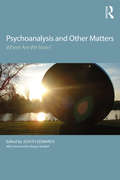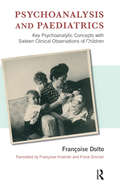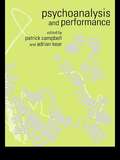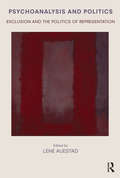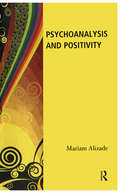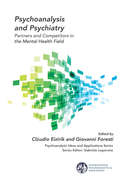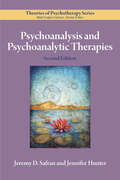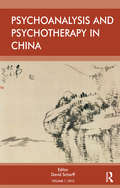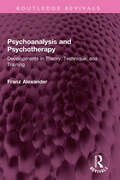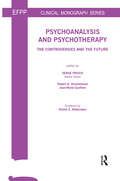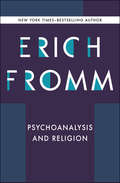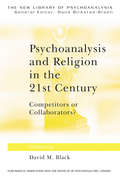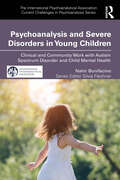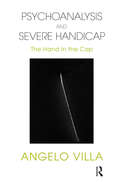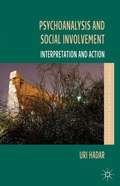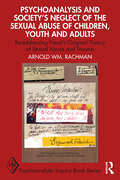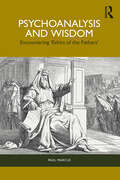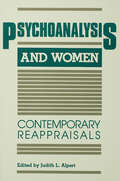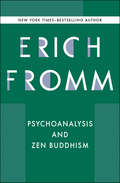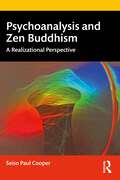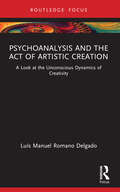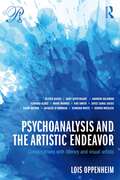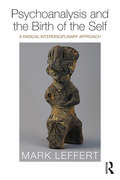- Table View
- List View
Psychoanalysis and Other Matters: Where Are We Now?
by Judith EdwardsCan we ‘stand inside’ new thoughts, rather than outside, looking at a closed box? This innovative and interdisciplinary collection aims to answer this question by broadening the way we look at and work with psychoanalytic ideas. By examining these ideas through the lenses of other disciplines, the contributors reveal what can be found when ‘boundaries’ are breached and bridges are built in psychoanalytical thought. Judith Edwards here calls upon international analysts, psychotherapists and other professionals to explore the concepts of ‘inside’ and ‘outside’ in psychoanalysis, boldly challenging existing boundaries. In this unique and ground-breaking collection, chapters are written by a mathematics professor, a sculptor, film-makers, anthropologists from Australia and Canada, an Ofsted inspector, a neuroscientist and two Chinese psychotherapists. The book emphasises the importance of listening across disciplinary lines, and crossing frontiers within psychoanalysis itself, by integrating psychoanalytic elements with poetry, music, literature, quantum physics, cultural studies and education. Edwards presents this original and global research with authority, showing us how these fields intersect and produce new understandings in us all that allow us to grow and benefit from new perspectives. This collection is unlike no other in its interdisciplinary and international approach. It will be an essential tool for all psychoanalysts, including those in training, as well as psychotherapists and psychotherapeutically-engaged scholars. It will also be of immense interest to academics and students of interdisciplinary studies, psychosocial studies, cultural studies and film studies.
Psychoanalysis and Paediatrics: Key Psychoanalytic Concepts with Sixteen Clinical Observations of Children
by Francoise DoltoThis book is the author's 1939 medical thesis and is dedicated to medical practitioners, paediatricians, and parents without prior knowledge of psychoanalysis. The author's aim was to sensitise people to the unconscious dimensions of many problems in children. She demonstrates here, through sixteen case studies, how often children's difficulties at school and at home - be they behavioural or due to impaired learning abilities - are the expression of psychological issues linked with their developing sexuality and castration anxiety, and result in physical symptoms such as enuresis and encopresis. The author points out that the awareness of the self and self-responsibility often develops for young people in families in which the parents do not know how to listen or even more importantly cannot be listened to with trust. There is also a summary of Freud's theories of the different stages of the evolution of the drives, as well as the central developmental role played by the castration complex, castration anxiety, and the Oedipus Complex.
Psychoanalysis and Performance
by Adrian Kear Patrick CampbellThe field of literary studies has long recognised the centrality of psychoanalysis as a method for looking at texts in a new way. But rarely has the relationship between psychoanalysis and performance been mapped out, either in terms of analysing the nature of performance itself, or in terms of making sense of specific performance-related activities. In this volume some of the most distinguished thinkers in the field make this exciting new connection and offer original perspectives on a wide variety of topics, including: · hypnotism and hysteria · ventriloquism and the body · dance and sublimation · the unconscious and the rehearsal process · melancholia and the uncanny · cloning and theatrical mimesis · censorship and activist performance · theatre and social memory. The arguments advanced here are based on the dual principle that psychoanalysis can provide a productive framework for understanding the work of performance, and that performance itself can help to investigate the problematic of identity.
Psychoanalysis and Philosophy of Mind: Unconscious Mentality in the Twenty-first Century
by Simon BoagOf the topics found in psychoanalytic theory it is Freud's philosophy of mind that is at once the most contentious and enduring. Psychoanalytic theory makes bold claims about the significance of unconscious mental processes and the wish-fulfilling activity of the mind, citing their importance for understanding the nature of dreams and explaining both normal and pathological behaviour. However, since Freud's initial work, both modern psychology and philosophy have had much to say about the merits of Freudian thinking. Developments in psychology, philosophy, and psychoanalysis raise new challenges and questions concerning Freud's theory of mind. This book addresses the psychoanalytic concept of mind in the 21st century via a joint scientific and philosophical appraisal of psychoanalytic theory. It provides a fresh critical appraisal and reflection on Freudian concepts, as well as addressing how current evidence and scientific thinking bear upon Freudian theory. The book centres upon the major concepts in psychoanalysis, including the notion of unconscious mental processes and wish-fulfilment and their relationship to dreams, fantasy, attachment processes, and neuroscience.
Psychoanalysis and Politics: Exclusion and the Politics of Representation
by Lene AuestadThis book examines the nature of social exclusion and the aspects of the politics of representation in the social, interpersonal, and political field. It questions how psychoanalysis can be used to think about the invisible and subtle processes of power over symbolic representation.
Psychoanalysis and Positivity
by Mariam AlizadeThis book explores certain asymptomatic areas of the mind and integrates them within the overall domain of psychopathological dynamics. It examines how positivity operates, and investigates the concept of the reversal of repetition, and the problematic issues raised by impasse and trauma.
Psychoanalysis and Psychiatry: Partners and Competitors in the Mental Health Field (The International Psychoanalytical Association Psychoanalytic Ideas and Applications Series)
by Cláudio Laks Eizirik Giovanni ForestiPsychoanalysis and Psychiatry: Partners and Competitors in the Mental Health Field offers a comprehensive overview of the many links between the two fields. There have long been connections between the two professions, but this is the first time the many points of contact have been set out clearly for practitioners from both fields. <P><P>Covering social and cultural factors, clinical practice, including diagnosis and treatment, and looking at teaching and continuing professional development, this book features contributions and exchange of ideas from an international group of clinicians from across both professions. <P><P>Psychoanalysis and Psychiatry: Partners and Competitors in the Mental Health Field will appeal to all practicing psychoanalysts and psychiatrists and anyone wanting to draw on the best of both fields in their theoretical understanding and clinical practice.
Psychoanalysis and Psychoanalytic Therapies (Theories of Psychotherapy Series®)
by Jennifer Hunter Jeremy D. SafranPsychoanalysis and Psychoanalytic Therapies provides an overview of the history, practice, and ongoing developments in the field of psychoanalysis. As the original theory of psychotherapy, psychoanalysis is often presented as a starting point in psychology theory courses. Yet, many people's understanding of psychoanalysis is limited to the classic Freudian approach. Psychoanalysis and Psychoanalytic Therapies, Second Edition provides an overview of the historical evolution of, and recent advancements in this vital group of theories and approaches to psychotherapy, that have been refined over more than a century of international work by key theorists, researchers, and clinicians. This primer to psychoanalytic approaches, including clinical strategies and case examples illustrating short‑ and long‑term psychoanalytic treatment, is an essential resource for students and trainees interested in learning about psychoanalysis, as well as experienced clinicians seeking to refresh their knowledge. This new edition has been updated to include more contemporary perspectives on identity, diversity, and intersectionality in the context of psychoanalysis, as well as an expanded discussion of defenses, dream interpretation, recent research, and ongoing developments in the field.
Psychoanalysis and Psychotherapy in China: Volume 1
by David E. ScharffThis peer-reviewed journal proposes to explore the introduction of psychoanalysis, psychoanalytic therapy, and the wider application of psychoanalytic ideas into China. It aims to have articles authored by Chinese and Western contributors, to explore ideas that apply to the Chinese clinical population, cultural issues relevant to the practice of analysis and psychotherapy, and to the cultural interface between Western ideas underpinning psychoanalysis, and the richness of Chinese intellectual and philosophical ideas that analysis must encounter in the process of its introduction. The journal will be published first in English and is also planned to be published in Chinese through a collaboration with a Chinese partner. We will feature theoretical and clinical contributions, philosophical and cultural explorations, applications such as the analytic study of art, cinema and theatre, social aspects of analytic thought, and wider cultural and social issues that set the context for clinical practice.
Psychoanalysis and Psychotherapy: Developments in Theory, Technique, and Training (Psychology Revivals)
by Franz AlexanderFirst published in 1957 Psychoanalysis and Psychotherapy summarizes and evaluates the trends in this field in the 1950s. By 1950s important changes have taken place as a result of growing acceptance of psychoanalysis by the medical community. More and more we realize the great possibilities of applying the knowledge gained from psychoanalysis to psychotherapy. What is called ‘dynamically oriented psychotherapy’ with its less complete and less intensive treatment can greatly benefit large group of patients. Dr Alexander illuminates interesting points of theory, discusses controversial issues, and offers views- his own and those of others- on questions of psychiatric training both in psychoanalytic institutes and in medical schools. This comprehensive book is a must read for everyone concerned with the urgent problem of mental health.
Psychoanalysis and Psychotherapy: The Controversies and the Future (The\efpp Monograph Ser.)
by Robert D. Hinshelwood Robert S. Wallerstein Serge Frisch Jean-Marie GauthierIn this, the sixth volume in the highly successful monograph series produced under the auspices of the European Federation for Psychoanalytic Psychotherapy in the Public Health Services (EFPP), the clear distinctions which once existed between psychoanalysis proper and the psychoanalytic psychotherapies are strongly debated and reassessed in the light of contemporary paradigm shifts in treatment modalities.
Psychoanalysis and Religion (The\terry Lectures Ser.)
by Erich FrommAn exploration of what religion and spirituality mean to us as humans, by the New York Times–bestselling author and social psychologist. In 1950, Erich Fromm attempted to free religion from its social function and to develop a new understanding of religious phenomena. Rather than analyzing what people believe in—whether they&’re monotheistic, polytheistic, or atheistic—Fromm presents an idea of what religion means in secular terms. In his timeless and straightforward style, Fromm unmasks the alienating effects of any authoritarian religion. He reveals how a humanistic religion is conducive to one&’s own humanity, and explains why psychoanalysis does not threaten religion. Whether you&’re a believer or a long-time atheist, Fromm&’s erudite analysis of religion is sure to reshape your concept of spirituality. This ebook features an illustrated biography of Erich Fromm including rare images and never-before-seen documents from the author&’s estate.
Psychoanalysis and Religion in the 21st Century: Competitors or Collaborators? (The New Library of Psychoanalysis)
by David M. BlackWhat can be gained from a dialogue between psychoanalysis and religion? Freud described religion as the universal obsessional neurosis, and uncompromisingly rejected it in favour of "science." Ever since, there has been the assumption that psychoanalysts are hostile to religion. Yet, from the beginning, individual analysts have questioned Freud's blanket rejection of religion. In this book, David Black brings together contributors from a wide range of schools and movements to discuss the issues. They bring a fresh perspective to the subject of religion and psychoanalysis, answering vital questions such as: How do religious stories carry (or distort) psychological truth? How do religions 'work', psychologically? What is the nature of religious experience? Are there parallels between psychoanalysis and particular religious traditions? Psychoanalysis and Religion in the 21st Century will be of great interest to psychoanalysts, psychoanalytic therapists, psychodynamic counsellors, and anyone interested in the issues surrounding psychoanalysis, religion, theology and spirituality.
Psychoanalysis and Severe Disorders in Young Children: Clinical and Community Work with Autism Spectrum Disorder and Child Mental Health (The International Psychoanalytical Association Current Challenges in Psychoanalysis)
by Nahir BonifacinoPsychoanalysis and Severe Disorders in Young Children presents case material and resources for professionals working with young children in the clinic and in the community.Presented in two main parts, the book explores Nahir Bonifacino’s work with children and their parents. The first part presents clinical case material from her work with several young children with an autism spectrum disorder diagnosis, illustrating an adaptation of child psychoanalytic technique that encourages patient communication. Part 2 considers outreach in the community, with resources for parents and professionals in frontline care roles that focus on a preventative approach to child mental health. The book closes with an appendix which translates psychoanalytic resources for use in early childhood education and care institutions.Psychoanalysis and Severe Disorders in Young Children will be of great interest to child psychoanalysts and psychoanalytic psychotherapists, clinical and educational psychologists, child psychiatrists, social workers, teachers and carers.
Psychoanalysis and Severe Handicap: The Hand in the Cap
by Angelo VillaThe book Psychoanalysis and Severe Handicap: The Hand in the Cap introduces an original look at handicap, a look aiming at capturing the subjectivity, no matter how weak or uncertain it may be, of the ill Other. In this light the work of operators can become an invaluable support to the creation of the self, a crucial help to self-narration, and a valid contribution to making one's way through the entangled intricacies of language. The text falls into six chapters, which elegantly and accurately lead us into the core of the problem tackled. Focusing on the difficulties implied by the recognition of the ill Other and the acceptance of the otherness, the author attacks those cultural policies which set autonomy and integration as absolute objectives to be achieved in the work on handicap. Instead, the author highlights the need of a path aiming at the structuring of the individuality of the disabled and at the molding of their subjectivity, starting from the subject's peculiarities.
Psychoanalysis and Social Involvement
by Uri HadarThis book considers psychoanalysis as an ethical enterprise, both on the level of the individual in analytic psychotherapy, and on the level of society in the global struggle for human and civil rights. Hadar examines the struggle against the Israeli occupation of Palestinian lives from a Lacanian psychoanalytical perspective.
Psychoanalysis and Society’s Neglect of the Sexual Abuse of Children, Youth and Adults: Re-addressing Freud’s Original Theory of Sexual Abuse and Trauma (Psychoanalytic Inquiry Book Series)
by Arnold Wm. RachmanThis book takes a comprehensive look at the understanding and treatment of child sexual abuse in psychoanalytic theory and practice, and in society as a whole. This book demonstrates how prophetic Ferenczi’s ideas about sexual abuse and trauma were, and how relevant they are for contemporary psychoanalysis and society. Sexual abuse, its traumatic effect, and the harm caused to children, youth, and adults will be described in the neglect of confronting sexual abuse by psychoanalysis and society. This neglect will be discussed in chapters about the abuse of children by religious leaders, students by teachers, youth in sports by coaches, and aspiring actors by authorities in the entertainment industry. It covers key topics such as why there has been silence about abuse in psychoanalysis, psychoanalytic theories, and practices that can be counterproductive or even harmful, case studies of abuse in the wider community, and how psychoanalysis as a profession can do better in its understanding and treatment of child sexual abuse both in psychoanalytic treatment and in its interaction with other parts of society. This book appeals to all psychoanalysts and psychoanalytic psychotherapists, as well as scholars interested in the history of psychoanalysis.
Psychoanalysis and Toileting: Minding One’s Business
by Paul MarcusPsychoanalysis and Toileting is an accessible book that delineates and interprets the psychological meanings of defecating and urinating in everyday life. Paul Marcus’ work gives the clinician an in-depth view of an activity that every patient and practitioner engage in and shows how not dealing with toileting in its wide range of social and practical contexts leaves out a huge aspect of the patient’s everyday experience. Drawing from psychoanalytic theory and practice, the author discusses such subjects as constipation, diarrhea and irritable bowel syndrome, adult female incontinence, toilet cursing, public toilet graffiti and toilet humor. The book also considers the personal meaning of urinating and defecating as seen in men suffering from an enlarged prostate, in ‘excremental assault’ in the Nazi concentration camps, and in dreaming. Marcus considers not only what is typically negative about these experiences, but what can be seen as positive in terms of growth and development for the ordinary person. The book is illustrated throughout with clinical vignettes and observations taken from the author’s private practice. Psychoanalysis and Toileting will be a key text for psychoanalysts and psychoanalytic psychotherapists in practice and in training. It will also be relevant to other mental health practitioners.
Psychoanalysis and Wisdom: Encountering ‘Ethics of the Fathers’
by Paul MarcusPsychoanalysis and Wisdom applies psychoanalytic insights into one of the great examples of wisdom literature, the Ethics of the Fathers, an ethical tractate of the Talmud.Paul Marcus quotes key passages from the Ethics of the Fathers, providing a psychoanalytic commentary to enlarge and deepen our understanding of its contents, focusing primarily on what constitutes a flourishing life. Marcus then considers what psychoanalysis can provide in its engagement with this classic of the wisdom teachings, such as illuminating aspects of the Ethics that are overlooked or underappreciated, and how “pearls of wisdom” from the Ethics can be incorporated into psychoanalytic theory and practice. The book contains clinical material as well as the insights of philosophers like Martin Buber, Gabriel Marcel and Emmanuel Levinas.Psychoanalysis and Wisdom will appeal to readers interested in psychoanalysis and psychotherapy and to academics and students of psychoanalytic studies, religious studies, Judaic studies and philosophy.
Psychoanalysis and Women: Contemporary Reappraisals
by Judith L. AlpertWithin the psychoanalytic framework, there is a growing body of research and thinking about female development. In addition, there is ongoing research within other areas of psychology, such as developmental psychology and social psychology, which has important implications for an understanding of women's adult development. Often these research findings are not readily available to the analytic community, nor has much of the research been incorporated into a psychoanalytic framework. Psychoanalysis and Women broadens analytic thinking by integrating contemporary literature from psychoanalysis with that of other areas, both within and outside psychology, which has implications for the undertanding of women's development. This literature is conceptualized within a psychoanalytic framework. A basic premise underlying this book is that psychoanalysis needs continuing review and revision in terms of what women and men are about and a continuing focus on whether and how unfounded biases prevent analysts from understanding patients. The present volume considers how sexism and feminism are affecting psychoanalysis and exemplifies how the emerging field of psychoanalysis of women and the issues its existence raises should be conceptualized. It also exemplifies some of the positive contributions that a feminist outlook gives to the study of human behavior and should esxpand the range of hypotheses that we have about people.
Psychoanalysis and Zen Buddhism (Condor Bks.)
by Erich FrommThe renowned psychoanalyst and New York Times–bestselling author of The Art of Loving unites philosophy from the East and West. In 1957, social philosopher and psychoanalyst Erich Fromm invited Daisetz T. Suzuki, the most famous Zen Buddhist master in the Western world, to a seminar at his new home in Cuernavaca, Mexico. Their discussion was one of the highlights of Fromm&’s life, and the paper Fromm presented (and later expanded into a book) was a watershed work. Fromm demonstrates his mastery of the philosophy and practice of Zen, perfectly articulating how Zen tenets fit into the ideas of psychoanalysis. In this text, he creates new perspectives on both systems of thought. This ebook features an illustrated biography of Erich Fromm including rare images and never-before-seen documents from the author&’s estate.
Psychoanalysis and Zen Buddhism: A Realizational Perspective
by Seiso Paul CooperIn this book, Cooper brings together psychoanalysis and Zen Buddhism by offering a comprehensive and integrated model, described as "The Realizational Model", that is consistent with the core concepts of Soto Zen Buddhism and psychoanalytic practice. Focusing primarily on Soto Zen Buddhism as presented in the original writings of the Japanese scholar monk Eihei Dōgen (1200-1253), and supported and elaborated by relevant contemporary scholarship in relation to the writings of the British psychoanalyst, Wilfred Bion (1897-1979), this book addresses the issue of how can one understand, assimilate, and integrate conceptions of the human mind that originate in the 13th and 20th centuries, as they are visited and inflected by the unconscious preconceptions of a 21st-century perspective. Expressing authentic Buddhist tradition within the frame of psychoanalytic thinking, and supported by online guided audio meditations that accompany the text, this work offers a uniquely interdisciplinary perspective of invaluable clinical significance. Case material garnered from 35 years of psychoanalytic practice as well as examples from daily life support the abstract concepts discussed in the text, rendering it equally relevant for psychoanalysts and psychotherapists, as well as students of Zen wishing to explore its practical applications.
Psychoanalysis and the Act of Artistic Creation: A Look at the Unconscious Dynamics of Creativity (Routledge Focus on Mental Health)
by Luís Manuel DelgadoThis book explores the phenomenon of creativity and creation from a psychoanalytic point of view, focusing on understanding the psycho-emotional dynamics underlying artistic creative activities, such as theatre, literature, and painting. Throughout, Delgado considers these works of art through a Bionian, Kleinian, and Freudian lens. He uses three major psychoanalytic models of the creative process, two of them classic: the first, Freudian, based on the theory of conflict between impulse and defense, the result of the effort to manage an excessive drive activity, and in which the concept of sublimation is central; the second, Kleinian, based on the attachment theory, in which creative effort corresponds to an attempt to repair the damage done to the object or to the self; and the third, more recent, affiliated with the more expanded attachment relationship theory, based on W. Bion’s theory of thinking, and emphasizing the continent’s capacity for psyche and the oscillation between schizo-paranoid and depressive positions. With illustrations throughout, this book will be vital reading for anyone interested in the intersection of creativity, the Arts, and psychoanalysis.
Psychoanalysis and the Artistic Endeavor: Conversations with literary and visual artists (Psychoanalysis in a New Key Book Series)
by Lois OppenheimPsychoanalysis and the Artistic Endeavor offers an intriguing window onto the creative thinking of several well-known and highly creative individuals. Internationally renowned writers, painters, choreographers, and others converse with the author about their work and how it has been informed by their life experience. Creative process frames the discussions, but the topics explored are wide-ranging and the interrelation of the personal and professional development of these artists is what comes to the fore. The conversations are unique in providing insight not only into the art at hand and into the perspective of each artist on his or her own work, but into the mind from which the work springs. The interviews are lively in a way critical writing by its very nature is not, rendering the ideas all that much more accessible. The transcription of the live interview reveals the kind of reflection censored elsewhere, the interplay of personal experience and creative process that are far more self-consciously shaped in a text written for print. Neither private conversation nor public lecture, neither crafted response (as to the media) nor freely associative discourse (as in the analytic consulting room), these interviews have elements of all. The volume guides the reader toward a deeper psychologically oriented understanding of literary and visual art, and it engages the reader in the honest and often-provocative revelations of a number of fascinating artists who pay testimony to their work in a way no one else can. This is a unique collection of particular interest for psychoanalysts, scholars, and anyone looking for a deeper understanding of the creative process.
Psychoanalysis and the Birth of the Self: A Radical Interdisciplinary Approach
by Mark LeffertThis book draws psychoanalysis out of unsubstantiated, hermeneutic speculation and into the science and philosophy of the Self. Mark Leffert offers a survey of where we as human beings come from, going back into prehistory and our development as individuals. Psychoanalysis and the Birth of the Self is written to provide psychoanalysts with interdisciplinary information drawn from fields that they may have had little access to. Leffert undertakes a novel integration of topics not frequently discussed together, resulting in a radical critique of the theorization of psychoanalysis. The book begins by setting the story with a short analysis of the history of psychoanalysis. A new science has been founded on the recognition of the impossibility of separating evolution from development; it is called Evo-Devo. Applied to the human condition, it integrates development with palaeoanthropology and forms the basis for exploring such topics as the neurophilosophy of consciousness, the birth of the Self, and its neurodevelopment. It includes epigenetics in the conversation. Leffert then takes a radical turn, integrating the biological Evo-Devo of the Self with the study of its Existence that is, Existentialism and Phenomenology. The integration of these two threads, Evo-Devo and Existentialism offers a powerful and unique tool for exploring the Self. The author offers an innovative way of understanding an individual that pulls together their biology, their development, and the way they choose to exist in the world. It steps outside of the traditional ways of clinically understanding an individual not by abandoning them but rather by powerfully supplementing them. Psychoanalysis and the Birth of the Self offers a novel, interdisciplinary braiding of disparate strands of knowledge that will be of interest to psychoanalysts as well as those in the disciplines of neuroscience, existentialism and phenomenology, and anthropology.
